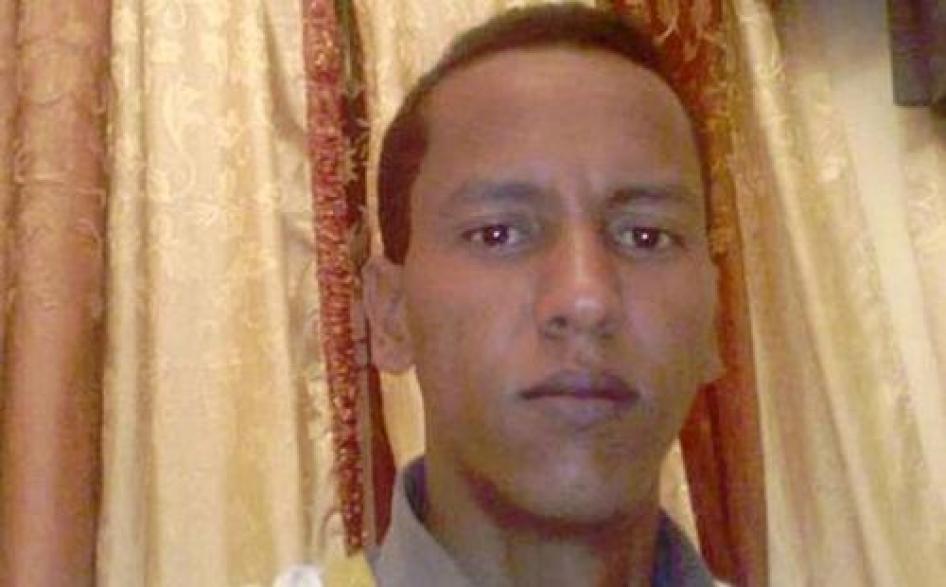(Tunis) – Mauritanian authorities should quash the death sentence for a Mauritanian blogger, Mohamed Cheikh Ould Mkhaitir, and drop all charges against him that violate freedom of expression, Human Rights Watch said today. The Court of Appeals in Nouadhibou is due to review the case on November 8, 2017.
Prosecutors charged Mkhaitir with apostasy for posting an online article in January 2014 questioning the use of religion to legitimize ethnic and caste discrimination in Mauritania. After three years of judicial proceedings, Mauritania’s Supreme Court in January set aside a ruling by the Court of Appeals that upheld the death sentence and referred the case to a new panel of judges for review.
“Mauritania has no business charging anyone with ‘apostasy,’ much less sentencing a blogger to death for such an absurd charge based on an article he wrote,” said Sarah Leah Whitson, Middle East and North Africa director at Human Rights Watch. “It’s good that the appeals court is reviewing this case, but he never should have been charged in the first place.”
Human Rights Watch raised concerns about the conviction, lengthy procedure, and extreme sentence Mkhaitir is facing for a speech offense with Justice Minister Mohamed Ould Daddah during a meeting in Nouakchott on October 19. “Mkhaitir is entitled to a fair trial in line with our international commitments,” he told Human Rights Watch. “I hope that he will be tried by the end of the year.”
It has almost been four years since Mauritanian authorities arrested Mkhaitir after the Mauritanian news website Aqlame published his blogpost on the marginalization of certain groups in Mauritania. He spent 12 months in pretrial detention, and a court sentenced him to death in December 2014 for “speaking lightly” of the Prophet and heresy.
In 2016, the Court of Appeals in Nouadhibou lowered the charges from “apostasy” (zendagha) to “disbelief” (ridda) but maintained the death sentence. The defense appealed the case to Mauritania’s Supreme Court, which set aside the lower court’s decision on January 31, 2017, and sent the case back to a new panel of judges from the same Court for a new hearing.
Some Mauritanian activists have noted that there has been an outpouring of protests over the article on religious grounds. Over the last two-and-a-half years, thousands of protesters have gathered on a number of occasions to call for Mkhaitir’s execution. On November 3, Mohamed Diop, journalist for the Mauritanian news agency Alakhbar, reported that police authorities prevented protesters calling for Mkhaitir’s execution from marching in the streets of Nouakchott and arrested four of them.
Mauritanian human rights activists who have publicly supported Mkhaitir have received death threats, Aminetou Mint Ely, a prominent women’s rights leader, told Human Rights Watch. In December 2016, Mkhaitir’s parents fled the country and sought asylum in France stating that they could no longer live in Mauritania under permanent threats.
Mauritania’s prosecution of Mkhaitir for his writing violates the international law guarantees protecting free speech, such as those enshrined in the International Covenant on Civil and Political Rights, to which Mauritania has been a party since 2004. The Mauritanian constitution guarantees freedom of opinion, thought, and expression. Restriction of speech, and in particular criminal prosecutions, should only be used as last resort, for a justifiable reason, when the law is clearly defined and the restriction is proportionate. Mkhaitir’s speech, given it could not conceivably be construed as incitement to violence or hatred, should never have been subject to prosecution.
Both United Nations and African human rights standards on the right to life encourage states to move toward abolition of the death penalty and in those states that retain the death penalty make clear it should be limited to the most serious crimes and can only be imposed after a fair trial. The African Commission on Human and Peoples’ Rights has stated that: “In those States which have not yet abolished the death penalty it is vital that it is used for only the most serious crimes – understood to be crimes involving intentional killing.”
Mauritanian prosecutors should drop the charges against Mkhaitir, Human Rights Watch said, and Mauritanian legislators should repeal penal code provisions that violate freedom of expression, including Article 306, which provides the death sentence for apostasy.









